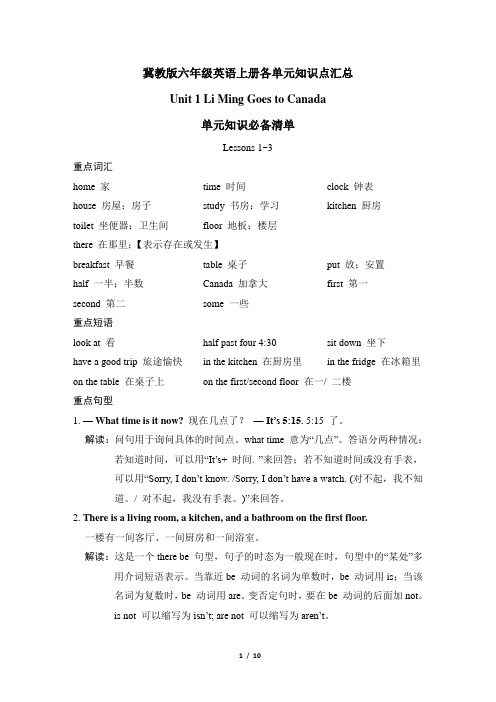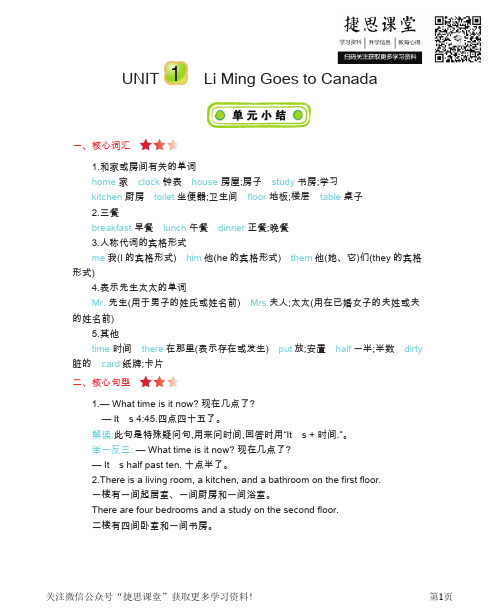最新冀教版英语六年级上册全册知识点归纳
冀教版英语六年级上册全册知识点归纳

最新冀教版英语六年级上册全册知识点归纳-CAL-FENGHAI.-(YICAI)-Company One1一单元一、单词: live(单三)lives, want(单三)wants, half kitchen house toilet bedroom,living room bathroom study (复数studies) fridge dish(复数dishes)反义词:dry-wet, dirty-clean,come(现在分词) coming make(现在分词)making cook(现在分词)-cookingwatch(现在分词)-watching sit(现在分词)-sitting read(现在分词)-reading,write(现在分词)-writing do(现在分词)-doing play(现在分词)---playing,二、课文重难点:1. at+较小的地点如at school 、at home in+大地点 in China in Beijing2. This is “这是….”用来介绍他人。
This is my friend, Li Ming.3. want 想要 want to do …想干….. 如:I want to fly kites.我想放风筝。
4.Li Ming’s plane will arrive at five o’clock.几点几分用at5. What time is it now? It’s half past five.现在几点了?现在5:30.6. Did you have a good trip Yes, thanks. but I’m tired你旅行愉快吗?是的,谢谢。
但是我有些累。
7. Let’s go home./ Let me help you.让我们回家。
让我帮助你。
8. learn English/Chinese 学英语/汉语9. This is / That is / These are/ Here is/ Here are10.I will show you the rooms in my house.我将领你们参观房子的各个房间。
冀教版六年级上册英语知识点

冀教版六年级上册英语知识点冀教版六年级上册英语知识点概述一、词汇学习1. 学校相关词汇:classroom, teacher, student, desk, chair, blackboard, library, etc.2. 家庭和人物描述:family, parent, grandparent, cousin, tall, short, thin, etc.3. 日常活动:get up, go to school, have lunch, play, do homework, go to bed, etc.4. 食物和饮料:apple, banana, chocolate, milk, tea, coffee, etc.5. 动物和自然:dog, cat, elephant, tiger, mountain, river, sea, etc.6. 职业和地点:doctor, nurse, farmer, bank, supermarket, park, etc.7. 交通方式:car, bus, bike, walk, train, plane, etc.8. 季节和天气:spring, summer, autumn, winter, sunny, rainy, snowy, etc.9. 数字和时间:numbers 1-100, o'clock, half past, quarter past, etc.10. 常见形容词和副词:big, small, fast, slow, often, usually, etc.二、语法要点1. 一般现在时:表示经常发生的动作或状态。
- 例句:She usually goes to school by bus.2. 一般过去时:表示过去某一时间发生的动作或状态。
- 例句:He visited his grandparents last weekend.3. 现在进行时:表示正在进行的动作。
冀教版六年级英语上册全册重点知识点

冀教版六年级英语上册知识点第一单元本单元学习目的:学会如何询问时间;询问对方想要吃什么的句型;there be句型以及现在进行时。
一、词汇:三餐: breakfast(早餐) lunch(午餐) dinner(晚餐)代词: me(我)(I的宾格形式) him(他)(he的宾格形式) them(他她它们)(they的宾格形式)其他:home(家)time (时间)clock(钟表)house(房屋;房子)study(书房;学习)kitchen(厨房) toilet(坐便器;卫生间)floor(地板;楼层)there(在哪里)(表示存在或发生)table(桌子) put(放;安置)half(一半;半数)dirty(脏的)card(纸牌;卡片)Mr.(先生)(用于男子的姓氏或姓名前)Mrs.(夫人;太太)(用在已婚女子的夫姓或夫的姓名前)二、习惯搭配:live in ...住在......play cards玩纸牌come to ...来到......look out小心,当心go to school去上学go home回家make dinner做晚餐after lunch午餐之后in the fridge在冰箱里on the table在桌子上on the first floor在一楼half past seven七点半三、知识点:arrive at+小地点(机场、车站等)(到达)in大地点(国家、省、市产)四、常用表达:1. There he is!他在那儿!2. Come in, please!请进!3. Nice to see you!很高兴见到你!4.Time for dinner!晚餐时间到了!五、重点句型:1.如何询问时间: What time is it?-----It’s+时间eg: What time is it? It's five o'clock.2. There be 句型(be动词的选择采用就近一致原则):There is a book on the desk.There are two bedrooms and a living room on the second floor.3.如何询问某人想要吃什么:What would + 主语+ like for breakfast / lunch / dinner?主语+would like+其他.举例eg:1.What would you like for breakfast?I would like some bread and milk.2.What would he like for lunch?He would like noodles and meat.4.询问某人正在做什么:What are / is +主语+ doing?主语is / am/ are +动词-ing+其他eg:1.What are you doing?I'm doing my homework.2.What is your mother doing?She is cooking dinner.第二单元本单元学习目的:掌握名词单数变复数的变化规则;熟练运用常见的频度副词,知道如何询问并回答天气情况和温度以及学校的课程安排。
冀教版六年级英语上册全册知识点汇总

冀教版六年级英语上册全册知识点汇总UNIT Li Ming Goes to Canada一、核心词汇1.和家或房间有关的单词home 家clock 钟表house 房屋;房子study 书房;学习kitchen 厨房toilet 坐便器;卫生间floor 地板;楼层table 桌子2.三餐breakfast 早餐lunch 午餐dinner 正餐;晚餐3.人称代词的宾格形式me我(I的宾格形式) him他(he的宾格形式) them他(她、它)们(they的宾格形式)4.表示先生太太的单词Mr. 先生(用于男子的姓氏或姓名前) Mrs.夫人;太太(用在已婚女子的夫姓或夫的姓名前)5.其他time 时间there在那里(表示存在或发生) put放;安置half一半;半数dirty 脏的card纸牌;卡片二、核心句型1.— What time is it now? 现在几点了?— It s 4:45.四点四十五了。
解读:此句是特殊疑问句,用来问时间,回答时用“It s + 时间.”。
举一反三: — What time is it now? 现在几点了?— It s half past ten. 十点半了。
2.There is a living room, a kitchen, and a bathroom on the first floor.一楼有一间起居室、一间厨房和一间浴室。
There are four bedrooms and a study on the second floor.二楼有四间卧室和一间书房。
解读: there be句型用于表达某处有(存在)某人或某物。
当there be后面跟可数名词单数或不可数名词时, be动词用is, 当后面跟可数名词复数形式时, be动词用are。
当句子中有几个并列的主语时, be动词的形式要与离其最近的一个主语在数上保持一致,此种用法被称为“就近原则”。
冀教版六年级英语上册各单元知识点汇总

冀教版六年级英语上册各单元知识点汇总Unit 1 Li Ming Goes to Canada单元知识必备清单Lessons 1~3重点词汇home 家time 时间clock 钟表house 房屋;房子study 书房;学习kitchen 厨房toilet 坐便器;卫生间floor 地板;楼层there 在那里;【表示存在或发生】breakfast 早餐table 桌子put 放;安置half 一半;半数Canada 加拿大first 第一second 第二some 一些重点短语look at 看half past four 4:30 sit down 坐下have a good trip 旅途愉快in the kitchen 在厨房里in the fridge 在冰箱里on the table 在桌子上on the first/second floor 在一/ 二楼重点句型1. — What time is it now?现在几点了?—It’s 5:15. 5:15 了。
解读:问句用于询问具体的时间点。
what time 意为“几点”。
答语分两种情况:若知道时间,可以用“It’s+ 时间. ”来回答;若不知道时间或没有手表,可以用“Sorry, I don’t know. /Sorry, I don’t have a watch. (对不起,我不知道。
/ 对不起,我没有手表。
)”来回答。
2. There is a living room, a kitchen, and a bathroom on the first floor.一楼有一间客厅、一间厨房和一间浴室。
解读:这是一个there be 句型,句子的时态为一般现在时,句型中的“某处”多用介词短语表示。
当靠近be 动词的名词为单数时,be 动词用is;当该名词为复数时,be 动词用are。
变否定句时,要在be 动词的后面加not。
is not 可以缩写为isn’t; are not 可以缩写为aren’t。
冀教版六年级上册英语知识点总结归纳

冀教版六年级上册英语知识点总结归纳UNIT 1 Li Ming Goes to Canada一、核心词汇1.和家或房间有关的单词home 家clock 钟表house 房屋;房子study 书房;学习kitchen 厨房toilet 坐便器;卫生间floor 地板;楼层table 桌子2.三餐breakfast 早餐lunch 午餐dinner 正餐;晚餐3.人称代词的宾格形式me我(I的宾格形式) him他(he的宾格形式) them他(她、它)们(they的宾格形式)4.表示先生太太的单词Mr. 先生(用于男子的姓氏或姓名前) Mrs.夫人;太太(用在已婚女子的夫姓或夫的姓名前)5.其他time 时间there在那里(表示存在或发生) put放;安置half一半;半数dirty 脏的card纸牌;卡片二、核心句型1.— What time is it now? 现在几点了?— It s 4:45.四点四十五了。
解读:此句是特殊疑问句,用来问时间,回答时用“It s + 时间.”。
举一反三: — What time is it now? 现在几点了?— It s half past ten. 十点半了。
2.There is a living room, a kitchen, and a bathroom on the first floor.一楼有一间起居室、一间厨房和一间浴室。
There are four bedrooms and a study on the second floor.二楼有四间卧室和一间书房。
解读: there be句型用于表达某处有(存在)某人或某物。
当there be后面跟可数名词单数或不可数名词时, be动词用is, 当后面跟可数名词复数形式时, be动词用are。
当句子中有几个并列的主语时, be动词的形式要与离其最近的一个主语在数上保持一致,此种用法被称为“就近原则”。
六年级上册英语冀教版知识要点

UNIT Li Ming Goes to Canada一、核心词汇1.和家或房间有关的单词home家clock钟表house房屋;房子study书房;学习kitchen厨房toilet坐便器;卫生间floor地板;楼层table桌子2.三餐breakfast早餐lunch午餐dinner正餐;晚餐3.人称代词的宾格形式me我(I的宾格形式)him他(he的宾格形式)them他(她、它)们(they的宾格形式)4.表示先生太太的单词Mr.先生(用于男子的姓氏或姓名前)Mrs.夫人;太太(用在已婚女子的夫姓或夫的姓名前)5.其他time时间there在那里(表示存在或发生)put放;安置half一半;半数dirty 脏的card纸牌;卡片二、核心句型1.—What time is it now?现在几点了?—It s4:45.四点四十五了。
解读:此句是特殊疑问句,用来问时间,回答时用“It s+时间.”。
举一反三:—What time is it now?现在几点了?—It s half past ten.十点半了。
2.There is a living room,a kitchen,and a bathroom on the first floor.一楼有一间起居室、一间厨房和一间浴室。
There are four bedrooms and a study on the second floor.二楼有四间卧室和一间书房。
解读:there be句型用于表达某处有(存在)某人或某物。
当there be后面跟可数名词单数或不可数名词时,be动词用is,当后面跟可数名词复数形式时,be动词用are。
当句子中有几个并列的主语时,be动词的形式要与离其最近的一个主语在数上保持一致,此种用法被称为“就近原则”。
举一反三:There is a pen and ten pencils on the desk.桌子上有一支钢笔和十支铅笔。
小学六年级上册冀教版英语 Unit 1 知识重点

UNIT Li Ming Goes to Canada一、核心词汇1.和家或房间有关的单词home 家clock 钟表house 房屋;房子study 书房;学习kitchen 厨房toilet 坐便器;卫生间floor 地板;楼层table 桌子2.三餐breakfast 早餐lunch 午餐dinner 正餐;晚餐3.人称代词的宾格形式me我(I的宾格形式) him他(he的宾格形式) them他(她、它)们(they的宾格形式)4.表示先生太太的单词Mr. 先生(用于男子的姓氏或姓名前) Mrs.夫人;太太(用在已婚女子的夫姓或夫的姓名前)5.其他time 时间there在那里(表示存在或发生) put放;安置half一半;半数dirty 脏的card纸牌;卡片二、核心句型1.— What time is it now?现在几点了?— It s 4:45.四点四十五了。
解读:此句是特殊疑问句,用来问时间,回答时用“It s + 时间.”。
举一反三:— What time is it now?现在几点了?— It s half past ten. 十点半了。
2.There is a living room, a kitchen, and a bathroom on the first floor.一楼有一间起居室、一间厨房和一间浴室。
There are four bedrooms and a study on the second floor.二楼有四间卧室和一间书房。
解读: there be句型用于表达某处有(存在)某人或某物。
当there be后面跟可数名词单数或不可数名词时, be动词用is,当后面跟可数名词复数形式时, be动词用are。
当句子中有几个并列的主语时, be动词的形式要与离其最近的一个主语在数上保持一致,此种用法被称为“就近原则”。
举一反三:There is a pen and ten pencils on the desk. 桌子上有一支钢笔和十支铅笔。
- 1、下载文档前请自行甄别文档内容的完整性,平台不提供额外的编辑、内容补充、找答案等附加服务。
- 2、"仅部分预览"的文档,不可在线预览部分如存在完整性等问题,可反馈申请退款(可完整预览的文档不适用该条件!)。
- 3、如文档侵犯您的权益,请联系客服反馈,我们会尽快为您处理(人工客服工作时间:9:00-18:30)。
一单元一、单词:live(单三)lives, want(单三)wants, half kitchen house toilet bedroom, living room bathroom study (复数studies)fridge dish(复数dishes)反义词:dry-wet, dirty-clean,come(现在分词) coming make(现在分词)making cook(现在分词)-cookingwatch(现在分词)-watching sit(现在分词)-sitting read(现在分词)-reading,write(现在分词)-writing do(现在分词)-doing play(现在分词)---playing,二、课文重难点:1. at+较小的地点如at school 、at home in+大地点in China in Beijing2. This is “这是….”用来介绍他人。
This is my friend, Li Ming.3. want 想要want to do …想干….. 如:I want to fly kites.我想放风筝。
4.Li Ming’s plane will arrive at five o’clock.几点几分用at5. What time is it now? It’s half past five.现在几点了?现在5:30.6. Did you have a good trip? Yes, thanks. but I’m tired你旅行愉快吗?是的,谢谢。
但是我有些累。
7. Let’s go home./ Let me help you.让我们回家。
让我帮助你。
8. learn English/Chinese 学英语/汉语9. This is / That is / These are/ Here is/ Here are10.I will show you the rooms in my house.我将领你们参观房子的各个房间。
11.on the first/second floor 在一/二楼(在几楼要用序数词和on)12.I make lunch in the kitchen 我在厨房做午饭13.I do my homework in the study.我在书房做作业14. Time for breakfast.= It’s time for breakfast.早餐时间到了。
15. It’s time for sth./ It’s time to do sth .是做什么的时间了。
It is time for dinner=it is time to have dinner.16. Would like sth./ Would like to do sth.想要什么。
想要做什么。
17. What would you like for breakfast / lunch/dinner? (三餐前面要用for)I would like…for breakfast / lunch/dinner?(通常would like 问would like答)18. Breakfast is ready. wash dishes make breakfast/lunch/dinner19. mum is cooking eggs in the kitchen 妈妈正在厨房煎鸡蛋。
20.Let’s put some dishes on the table.让我们把盘子放到桌子上。
21.I only ate an apple for lunch.午饭我只吃了一个苹果。
22. What’s for supper?晚餐有什么?23. What are you doing? / We are washing hands. 你正在做什么?我们正在洗手。
What are they doing? (通常doing 问ing答)24. Now the dishes are clean and dry.现在盘子洁净干爽。
25. I wash the dirty dishes.我洗脏盘子。
26. May I help you? Sure.我可以帮你吗?当然。
27.watch TV / read the newspaper/write a letter28. Do you like this show? Yes,I do/No,I don’t.(通常do问do 答)29. I am sitting at a small table.我正坐在小桌子旁边二单元一、单词:always often sometimes never bus stop bus driver school bussubject class math science art PE music temperature,(反义词)hot---cold, ill-----healthy健康的名词复数规则1.一般情况下,直接加-s,如:book-books, bag-bags, cat-cats, bed-beds2.以s. x. sh. ch结尾,加-es,如:bus-buses, box-boxes, brush-brushes, watch-watches3.以“辅音字母+y”结尾,变y为i, 再加-es,如:family-families, city - cities4.以“f或fe”结尾,变f或fe为v, 再加-es,如:leaf-leavesdegree(复数)degrees box—boxes bus—busestomato –tomatoes potato---potatoes photo-----photos (土豆,西红柿+es,其余+s) man(复数)---men, woman(复数)---women, child(复数)---children foot(复数)---feet2. 频率副词用法:一般都放在动词前,am/ is/ are的后面。
如:He never wears dresses./ he is always late.二、课文重难点:1.I always have my umbrella on a rainy day.我总是在下雨时打伞。
2.Here comes the school bus.校车来了3. I live too far from my school 我住的离学校很远。
on the school bus.在校车上4. Do you go to school by …?你……去上学?5. Jenny often goes to school by bus.詹妮经常坐公交车去上学Sometimes she rides her bike. she never walks.有时她骑自行车。
她从不步行去上学。
一般现在时当主语为第三人称单数(he, she, it)时,要用动词的第三人称单数,主语为复数时,要用动词原型。
如:Mary likes Chinese.We like cat。
动词+s的变化规则:1)一般情况下,直接加-s,如:cook-cooks, bring--brings2)以s. x. sh. ch. o结尾,加-es,如:guess-guesses, wash-washes, watch-watches, go-goes 3)以“辅音字母+y”结尾,变y为i, 再加-es,如:study-studies6. Where are you from? I am from China/ Bao Ding来自中国保定。
7、What subjects do you have in your school?你在学校有哪些科目?8、How many classes do you have each school day? 每天你在学校有多少节课?Three classes in the morning and two in the afternoon.上午三节,下午两节。
9. How’s the weather today? It’s rainy.今天天气怎样?多雨。
10. What’s the temperature? It’s ten degrees.气温多少度?十度。
What’s the chicken’s temperature?鸡的体温温是多少?11.The temperature of a healthy chicken is always 41.5degrees.健康的鸡的体温总是41.5度。
12. This/That is a/an/one…+单个名词These/ Those are (some/many) …+名词复数13. These men /These women/ These children are young /singing/playing.14. Do you always…? / Does he often…15. walk to school / help his mother / ride my bike / do your homework16. Let’s put…for…Let’s put an A/O/S/N for always/often/sometimes/never.三单元单词:spring, summer, autumn, winter, scarf, ice, winter clothesput(现在分词)putting、skate滑冰think, teach,fall down fun, favouriteleaf(复数)---leaves, snowman(复数) snowmen,,反义词put on ---take off up---down teach----learnrain(形容词) rainy, wind (形容词) windy, sun (形容词)sunny,snow(形容词) snowy cloud (形容词) cloudy二、课文重难点:1. There are four seasons in a year.一年有四季There is ice and snow in winter.冬天有冰和雪。
2.The summer sun is hot.夏日的骄阳似火。
3.The leaves turn red and yellow in autumn.叶子在秋天变成红色和黄色4. What a hot, sunny day!多么热、晴朗的天啊!5. Jenny and Li Ming are going out to play with Danny.詹妮和李明要出去和丹尼玩。
